Day 97 - Kathmandu
-----
Welcome to the top of the world. Well, closer anyway.
Three weeks ago we had a fifteen minute conversation with two strangers about visiting Nepal eventually. Their adament advice?
"The monsoon is coming. Hurry."
We've now been in Kathmandu for two days and it's like nothing we've ever experienced. We've both dreamed of coming here for a long time and it's exactly what we imagined for a city that sits in the middle of the Himalayas. You get the feeling not much has changed here in the last hundred years. There doesn't seem to be a modern section to the city, nor has much been re-built to "look" like Nepal (which always seemed to be the case in China).
Tomorrow we begin our drift around Nepal. We'll start in Royal Chitwan National Park and go from there. Three weeks from now we'll be back in Kathmandu, which happens to have a great postal service for people who haven't had there favorite american candy (sour patch kids, american red licorice, jelly bellies, big and small chewy sweet tarts)or recieved any mail from home in way too long. So for anyone out there who happens to have friends traveling in Nepal, here's the address:
Full Name
Poste Restante
General Post Office
Kathmandu, Nepal
(Another magical part about Kathmandu = no zip code.)
May 31, 2007
Day 102 - Pokhara
-----
Near the border of India in Southern Nepal sits a National Park called Royal Chitwan. It's home to numerous wildlife including bears, tigers, elephants, rhinocerous, alligators and monkeys.
On our first day in the park we spent a few hours hiking through the jungle. Even with our guide, we both felt uneasy. When hiking back in the States, I have a pretty clear idea of what to do if I come across a grizzly or black bear. But coming across a fricken TIGER is another thing entirely.
So, we're walking along when all of a sudden our guide stops us out of nowhere and motions for us to shut the hell up. Believing the animal in question was probably a spotted deer or a monkey, we leisurely stopped in our tracks. It was at this point that our seasoned guide turned and mouthed a word that you might want to hear if you were in a jeep, or a helicopter perhaps.
"Tiger."
As we looked at each other in terror, it was obvious that both of our hearts were pounding. I then acted as any man would given the same situation. I picked up a stick.
Then we heard it. A spine shivering GROWL that was as haunting as it was close.
In a blaze of unadulterated fear, Kari and I turned and ran faster than we ever have in our lives, taking shelter behind tree that measured six inches in diameter. After noticing that our guide hadn't moved a muscle and realizing that being on our own was probably the worst decision we could make, we slowly headed back to the safe presence of our five-foot, three-inch guide. And in another moment, the animal was gone. While our hearts began pumping at a more relaxed pace, our guide simply laughed at us.
Within a few hours, we were back in the safety of our jungle bungalow, with the hotel pet keeping watch just five feet from our door. A ten thousand pound elephant.




-----
Near the border of India in Southern Nepal sits a National Park called Royal Chitwan. It's home to numerous wildlife including bears, tigers, elephants, rhinocerous, alligators and monkeys.
On our first day in the park we spent a few hours hiking through the jungle. Even with our guide, we both felt uneasy. When hiking back in the States, I have a pretty clear idea of what to do if I come across a grizzly or black bear. But coming across a fricken TIGER is another thing entirely.
So, we're walking along when all of a sudden our guide stops us out of nowhere and motions for us to shut the hell up. Believing the animal in question was probably a spotted deer or a monkey, we leisurely stopped in our tracks. It was at this point that our seasoned guide turned and mouthed a word that you might want to hear if you were in a jeep, or a helicopter perhaps.
"Tiger."
As we looked at each other in terror, it was obvious that both of our hearts were pounding. I then acted as any man would given the same situation. I picked up a stick.
Then we heard it. A spine shivering GROWL that was as haunting as it was close.
In a blaze of unadulterated fear, Kari and I turned and ran faster than we ever have in our lives, taking shelter behind tree that measured six inches in diameter. After noticing that our guide hadn't moved a muscle and realizing that being on our own was probably the worst decision we could make, we slowly headed back to the safe presence of our five-foot, three-inch guide. And in another moment, the animal was gone. While our hearts began pumping at a more relaxed pace, our guide simply laughed at us.
Within a few hours, we were back in the safety of our jungle bungalow, with the hotel pet keeping watch just five feet from our door. A ten thousand pound elephant.




May 30, 2007
Day 104 - Pokhara
-----
One of the more pleasurable things about not working for months on end is being able to read. While buying books overseas is actually more expensive than using half.com or amazon, most of the books are worth every dollar. Here is what we've read so far (more for our reference than anything else!):
China:
4 stars - Extremely Loud and Incredibly Close - Jonathon Safran Foyer
3 stars - Endurance - Alfred Lansing
4 stars - All Families Are Psychotic - Douglas Coupland
2 stars - Sex, Drugs and Cocoa Puffs - Chuck Klosterman
2 stars - A Long Way Down - Nick Hornby
4 stars - Atlas Shrugged - Ayn Rand
1 star - Waiting - Ha Jin
Vietnam:
2 stars - Catfish and Mandala - Andrew Pham
1 star - The Sorrow of War - Bao Ninh
2 stars - The Complete History of the Vietnam War - BBC
Cambodia:
2 stars - Stay Alive My Son - Pin Yathay
3 stars - Slaughterhouse 5 - Kurt Vonnegut Jr
1 star - The Alchemist - Paola Coehlo
Thailand:
2 stars - Bangkok 8 - John Burdett
2 stars - Mr. Nice - Howard Marks
-----
One of the more pleasurable things about not working for months on end is being able to read. While buying books overseas is actually more expensive than using half.com or amazon, most of the books are worth every dollar. Here is what we've read so far (more for our reference than anything else!):
China:
4 stars - Extremely Loud and Incredibly Close - Jonathon Safran Foyer
3 stars - Endurance - Alfred Lansing
4 stars - All Families Are Psychotic - Douglas Coupland
2 stars - Sex, Drugs and Cocoa Puffs - Chuck Klosterman
2 stars - A Long Way Down - Nick Hornby
4 stars - Atlas Shrugged - Ayn Rand
1 star - Waiting - Ha Jin
Vietnam:
2 stars - Catfish and Mandala - Andrew Pham
1 star - The Sorrow of War - Bao Ninh
2 stars - The Complete History of the Vietnam War - BBC
Cambodia:
2 stars - Stay Alive My Son - Pin Yathay
3 stars - Slaughterhouse 5 - Kurt Vonnegut Jr
1 star - The Alchemist - Paola Coehlo
Thailand:
2 stars - Bangkok 8 - John Burdett
2 stars - Mr. Nice - Howard Marks
May 29, 2007
Day 106 - Pokhara
-----
While you may never believe it, or never want to believe it, backpacking can get very tiring.
The life of a long-term backpacker primarily consists of a few simple activities. The first is taking the role of a tourist, or more to the point, seeing stuff. Every country in the world has a laundry list of sites to see. And it seems to make no difference if the site is worth visiting, like the killing fields perhaps, as long as one is in a country, the site feels mandatory. Essentially, the main reason we travel the world is simply to have a look around the place.
The second activity enjoyed by backpackers is that of relaxing. While we may spend a few hours in a canoe exploring a reef, the rest of the day is spent doing nothing in particular. You'd be amazed at the amount of restaurants showing nightly movies, no frills guesthouses offering cable tv "with over 100 channels" and countless bookstores selling popular novels at exhorbitant prices, just because they can. When you have a while and no particular place to be, laying low becomes part of your existance.
For 99 days, we fell into the former backpacker life. If there was something to see, we saw it. We left our mark at every museum, monument, temple, ruin and other sites of natural beauty. We scoffed at other travelers who watched movies and spent days on end going nowhere. I mean, we're in the middle of China's most epic countryside and people are watching soccer? For 99 days, we were on the go.
It took 99 days to realize that constantly moving was taking its toll on us. In our pursuit of packing in as much as each visa would allow us, we found ourselves getting more and more tired. We racked up a staggering 390 hours on public transport. That's sixteen full days spent in uncomfortable buses riding on uncomfortable roads. Sites began losing their glory and we began losing our wonderment. So, on arriving in the lakeside village of Pokhara, we decided that if we were going to make it for the long haul, we better slow down. Considerably.
Every morning I get up and watch the NBA playoffs or a baseball game. We eat three meals a day, each lasting as long as we desire. Every afternoon we read, go on-line, watch the news and take naps. At night, we pick out a restaurant purely based on what movie it's showing. For the past seven days, we have left our lakeside village one time. Here we are in the middle of Nepal, surrounded by 27,000 foot mountains, and we're laying in our room watching a dubbed over Mission Cleopatra. And so, much like in our normal lives back home, we're learning to find our rhythym.
I'm just glad it happens to be at the same time we have ESPN.
-----
While you may never believe it, or never want to believe it, backpacking can get very tiring.
The life of a long-term backpacker primarily consists of a few simple activities. The first is taking the role of a tourist, or more to the point, seeing stuff. Every country in the world has a laundry list of sites to see. And it seems to make no difference if the site is worth visiting, like the killing fields perhaps, as long as one is in a country, the site feels mandatory. Essentially, the main reason we travel the world is simply to have a look around the place.
The second activity enjoyed by backpackers is that of relaxing. While we may spend a few hours in a canoe exploring a reef, the rest of the day is spent doing nothing in particular. You'd be amazed at the amount of restaurants showing nightly movies, no frills guesthouses offering cable tv "with over 100 channels" and countless bookstores selling popular novels at exhorbitant prices, just because they can. When you have a while and no particular place to be, laying low becomes part of your existance.
For 99 days, we fell into the former backpacker life. If there was something to see, we saw it. We left our mark at every museum, monument, temple, ruin and other sites of natural beauty. We scoffed at other travelers who watched movies and spent days on end going nowhere. I mean, we're in the middle of China's most epic countryside and people are watching soccer? For 99 days, we were on the go.
It took 99 days to realize that constantly moving was taking its toll on us. In our pursuit of packing in as much as each visa would allow us, we found ourselves getting more and more tired. We racked up a staggering 390 hours on public transport. That's sixteen full days spent in uncomfortable buses riding on uncomfortable roads. Sites began losing their glory and we began losing our wonderment. So, on arriving in the lakeside village of Pokhara, we decided that if we were going to make it for the long haul, we better slow down. Considerably.
Every morning I get up and watch the NBA playoffs or a baseball game. We eat three meals a day, each lasting as long as we desire. Every afternoon we read, go on-line, watch the news and take naps. At night, we pick out a restaurant purely based on what movie it's showing. For the past seven days, we have left our lakeside village one time. Here we are in the middle of Nepal, surrounded by 27,000 foot mountains, and we're laying in our room watching a dubbed over Mission Cleopatra. And so, much like in our normal lives back home, we're learning to find our rhythym.
I'm just glad it happens to be at the same time we have ESPN.
May 28, 2007
May 27, 2007
Day 116 - Kathmandu
-----
Let me set up our day yesterday: The temperature is hovering around 100 degrees. A narrow road winds dangerously around mountains with no guardrails in sight. There's a large convoy of UN trucks and other vehicles making it impossible to breath without taking in cough inducing exhaust. An old 24-seat bus is occupied by fifty passengers all squeezed in. And on the roof of that bus are Kari and I, sitting on a scalding hot metal roof rack. Adventure is one thing, but spending five and a half hours on the top of a bus cooking in the hot sun, using bandanas to breathe and furociously holding on to a metal luggage rack is another.
What we were told would happen upon finishing our rafting trip was that a tourist bus, with two cushioned seats, would pick us up and drop us off in Kathmandu three and half hours later. Not quite.
You might assume what happened yesterday was abnormal, a rare occurance in the the traveler's life. But it's quite the opposite actually. We've come to learn that sitting on top of a bus for five and a half hours in 1o0 degree heat is just the kind of odd reality that travelers face, especically in developing nations such as Nepal. A "maximum" twelve hour bus ride actually takes sixteen. The toilet the bus was "definately" equipped with hasn't worked for a decade, leaving you desperately wishing you hadn't chugged that bottle of water. Even the eggs that you ordered over easy come out fried to death. And the cable television that you hoped would allow you to escape for a few days has the promised 200 channels but only one of them is in English, playing nothing but canceled sitcoms from the 90's. What you might expect from the developing world is road congestion, poverty and maybe some unfamiliar smells. What you don't expect are broken promises from the tour agents and large cable companies that don't carry CNN. The simple truth is that when it comes to travel, disappointment is inevitable.
Now, this disappointment can hardly be blamed on the locals who travelers interact with on a daily basis. Between language barriers and cultural differences, much is lost in translation. And when you add a dose of desperation, well, sometimes promises are made that can't be delivered. But nor does the blame lie with the travelers themselves. It's hard to make a shift in mindset when you come from New Zealand or San Francisco or Europe - places where promises are kept and where apologies are made when things don't go as planned. It's hard to remember that the beach lined with trash in Cambodia, for example, isn't the south of France.
So after four month on the road, we find ourselves on top of a bus. The constant application of sunscreen isn't protecting us from burning, and the bags of rice propped behind us are causing backaches. But you know what? That's okay.
We are learning, that to preserve our sanity and the beauty of this trip, we need to take things as they come.
-----
Let me set up our day yesterday: The temperature is hovering around 100 degrees. A narrow road winds dangerously around mountains with no guardrails in sight. There's a large convoy of UN trucks and other vehicles making it impossible to breath without taking in cough inducing exhaust. An old 24-seat bus is occupied by fifty passengers all squeezed in. And on the roof of that bus are Kari and I, sitting on a scalding hot metal roof rack. Adventure is one thing, but spending five and a half hours on the top of a bus cooking in the hot sun, using bandanas to breathe and furociously holding on to a metal luggage rack is another.
What we were told would happen upon finishing our rafting trip was that a tourist bus, with two cushioned seats, would pick us up and drop us off in Kathmandu three and half hours later. Not quite.
You might assume what happened yesterday was abnormal, a rare occurance in the the traveler's life. But it's quite the opposite actually. We've come to learn that sitting on top of a bus for five and a half hours in 1o0 degree heat is just the kind of odd reality that travelers face, especically in developing nations such as Nepal. A "maximum" twelve hour bus ride actually takes sixteen. The toilet the bus was "definately" equipped with hasn't worked for a decade, leaving you desperately wishing you hadn't chugged that bottle of water. Even the eggs that you ordered over easy come out fried to death. And the cable television that you hoped would allow you to escape for a few days has the promised 200 channels but only one of them is in English, playing nothing but canceled sitcoms from the 90's. What you might expect from the developing world is road congestion, poverty and maybe some unfamiliar smells. What you don't expect are broken promises from the tour agents and large cable companies that don't carry CNN. The simple truth is that when it comes to travel, disappointment is inevitable.
Now, this disappointment can hardly be blamed on the locals who travelers interact with on a daily basis. Between language barriers and cultural differences, much is lost in translation. And when you add a dose of desperation, well, sometimes promises are made that can't be delivered. But nor does the blame lie with the travelers themselves. It's hard to make a shift in mindset when you come from New Zealand or San Francisco or Europe - places where promises are kept and where apologies are made when things don't go as planned. It's hard to remember that the beach lined with trash in Cambodia, for example, isn't the south of France.
So after four month on the road, we find ourselves on top of a bus. The constant application of sunscreen isn't protecting us from burning, and the bags of rice propped behind us are causing backaches. But you know what? That's okay.
We are learning, that to preserve our sanity and the beauty of this trip, we need to take things as they come.
May 25, 2007
Day 120 - Kathmandu
-----
While we continue to spend most of our time laying low, we have managed to take long walks every day around the Kathmandu Valley. Here's a little of what we saw:
Kathmandu Valley
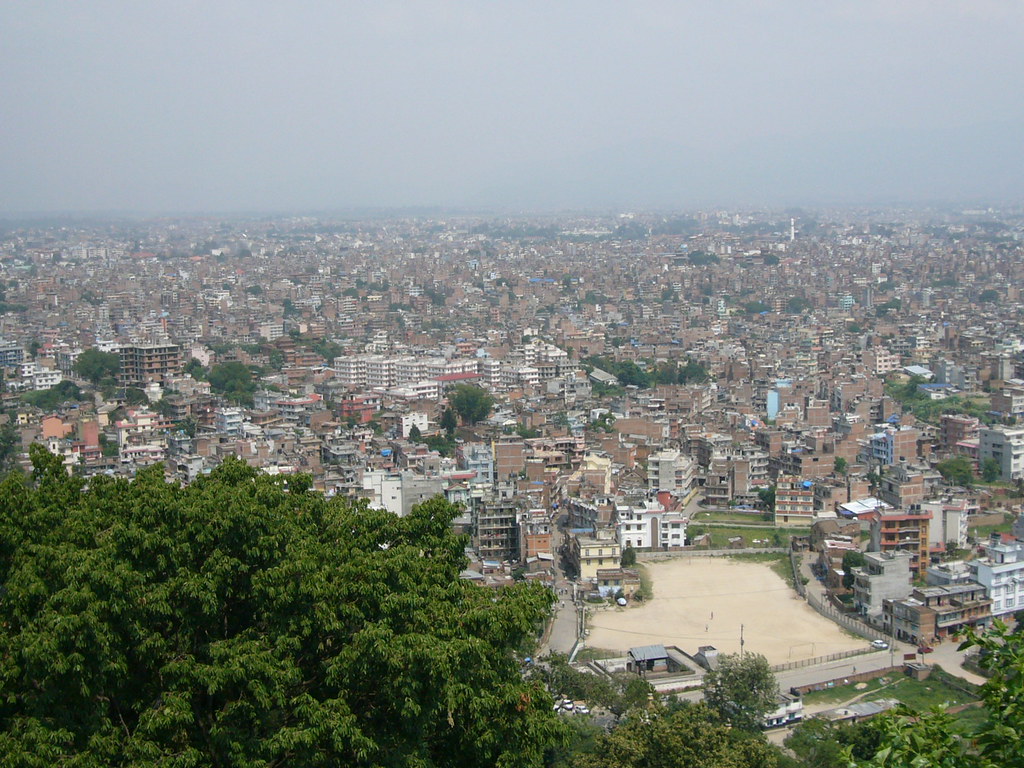
Kathmandu: Thamel: Backpacker Haven
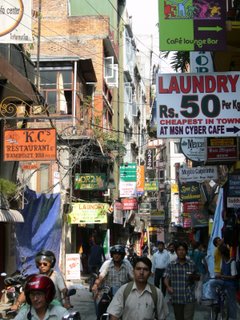
Kathmandu: Monkey Temple
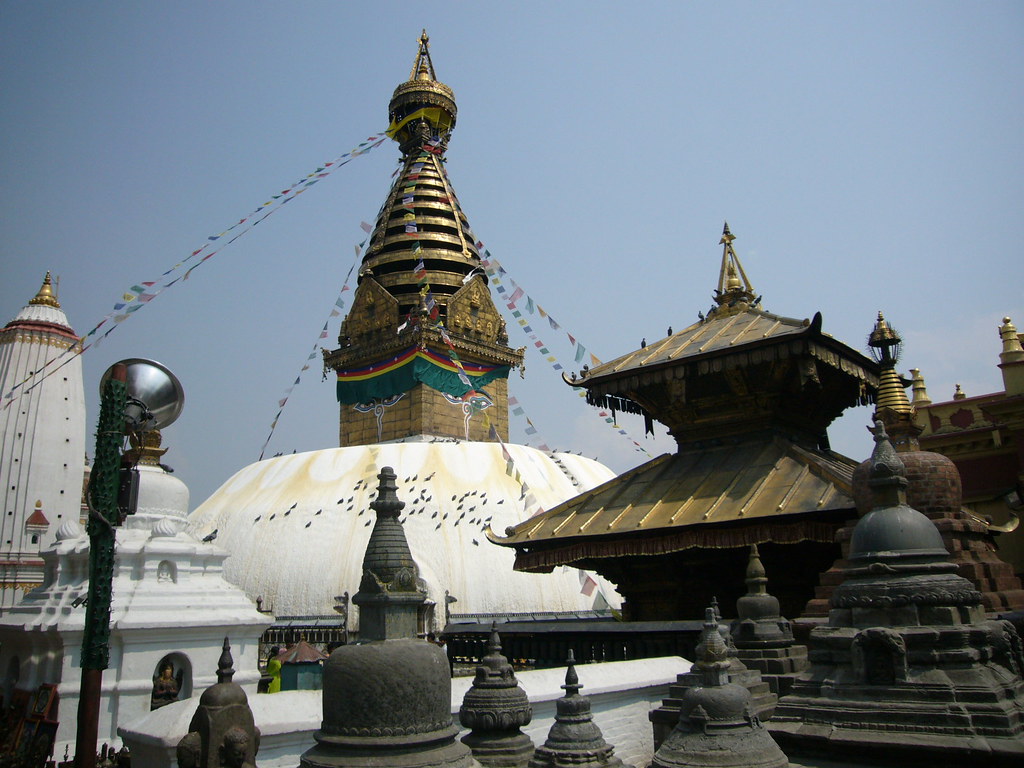
Kathmandu: Patan

Kathmandu: Patan: Durbar Square
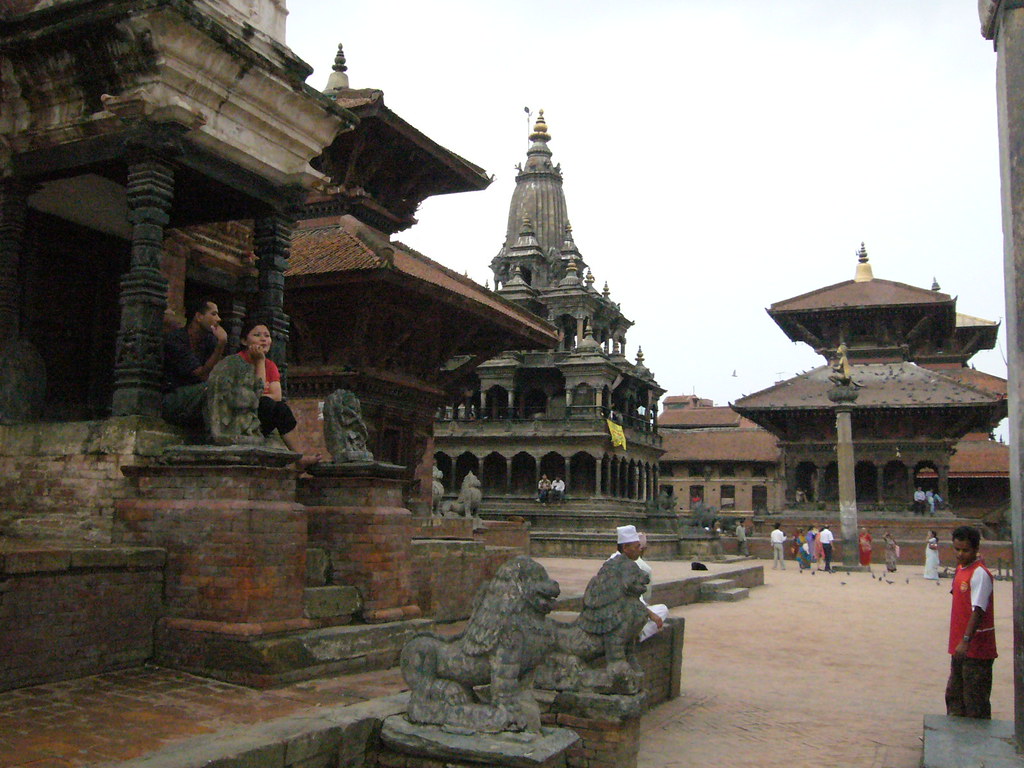
A few more photos can be seen here.
-----
While we continue to spend most of our time laying low, we have managed to take long walks every day around the Kathmandu Valley. Here's a little of what we saw:





A few more photos can be seen here.
Day 122 - Kathmandu
-----
The walk to the Post Office is two miles from our Guest House in Khatmandu's Thamel. We brought our passports because that's what's needed to pick up mail via the Poste Restante system.
We should have brought a backpack.
We arrived at the dilapidated General Post Office with high hopes. Even one package filled with sour patch kids would have made the walk home seem effortless. Upon arrival, we were taken into a back room and directed to look into a small box for any packages that might have been for us. Nothing.
We then called a postal worker over and explained that there had to be a package for us. I tried to tell him that we get a lot of hits every day on our website and that at least one kind hearted individual responded to our plea for candy (Okay, I didn't really say that). He must have felt sorry for us because he graciously went back to the box to look for something. After a few moments he pulled out a small piece of paper that read "Josh and Kari Jackson." I think I shed a tear of joy.
In the end we received twelve pounds of licorice, reeses pieces, jelly bellies and other processed goodies. Now comes the hard part. Trying to divide it up.
[A special thanks to those of you who went completely out of your way to make trips to the store and Post Office in order to get us candy. And by the looks of how much each package cost you, well, it makes each bite all the more special.]

-----
The walk to the Post Office is two miles from our Guest House in Khatmandu's Thamel. We brought our passports because that's what's needed to pick up mail via the Poste Restante system.
We should have brought a backpack.
We arrived at the dilapidated General Post Office with high hopes. Even one package filled with sour patch kids would have made the walk home seem effortless. Upon arrival, we were taken into a back room and directed to look into a small box for any packages that might have been for us. Nothing.
We then called a postal worker over and explained that there had to be a package for us. I tried to tell him that we get a lot of hits every day on our website and that at least one kind hearted individual responded to our plea for candy (Okay, I didn't really say that). He must have felt sorry for us because he graciously went back to the box to look for something. After a few moments he pulled out a small piece of paper that read "Josh and Kari Jackson." I think I shed a tear of joy.
In the end we received twelve pounds of licorice, reeses pieces, jelly bellies and other processed goodies. Now comes the hard part. Trying to divide it up.
[A special thanks to those of you who went completely out of your way to make trips to the store and Post Office in order to get us candy. And by the looks of how much each package cost you, well, it makes each bite all the more special.]

May 23, 2007
Day 123 - In Transit
-----
We were warned about coming to Nepal. The guidebooks and travel agents all seem to offer the same caution: "You better check the security situation." Since the Maoist "people's war" started seven years ago, twelve thousand people have died and the quality of life for many Nepali's has taken a downward turn. Numerous blockades, strikes, protests and dawn to dusk curfews now occur in Nepal on a regular basis.
In the past month we have witnessed many of these new realities. On our first walk into the heart of Kathmandu, we observed thousands of Maoist protesting a government that won't allow them a seat in the house. A week later we experienced a taxi strike, where dozens of taxi drivers parked their cars in the middle of a busy intersection to show their disapproval of the Nepali police.
However, during our month in Nepal, we haven't felt even a hint of danger.
All this talk of danger gets you thinking. Last year in Los Angeles, the city that I call home, 402 people were murdered. Some guidebooks even suggest to stay out of certain neighborhoods in the LA area. I was reminded of the perceived dangers in my city a few weeks ago when we spent a day with a couple of Israeli girls. They told stories of being searched when going shopping and of looking out for possible bombers when riding the local bus. But when we expressed our fear of backpacking in Israel, they were surprised. Both girls said they would be much more afraid to visit the United States because "at least in Israel you can walk the streets at night."
I guess danger is all a matter of perspective.
__________________
The following map shows what where we have traveled over the past month in Nepal.

-----
We were warned about coming to Nepal. The guidebooks and travel agents all seem to offer the same caution: "You better check the security situation." Since the Maoist "people's war" started seven years ago, twelve thousand people have died and the quality of life for many Nepali's has taken a downward turn. Numerous blockades, strikes, protests and dawn to dusk curfews now occur in Nepal on a regular basis.
In the past month we have witnessed many of these new realities. On our first walk into the heart of Kathmandu, we observed thousands of Maoist protesting a government that won't allow them a seat in the house. A week later we experienced a taxi strike, where dozens of taxi drivers parked their cars in the middle of a busy intersection to show their disapproval of the Nepali police.
However, during our month in Nepal, we haven't felt even a hint of danger.
All this talk of danger gets you thinking. Last year in Los Angeles, the city that I call home, 402 people were murdered. Some guidebooks even suggest to stay out of certain neighborhoods in the LA area. I was reminded of the perceived dangers in my city a few weeks ago when we spent a day with a couple of Israeli girls. They told stories of being searched when going shopping and of looking out for possible bombers when riding the local bus. But when we expressed our fear of backpacking in Israel, they were surprised. Both girls said they would be much more afraid to visit the United States because "at least in Israel you can walk the streets at night."
I guess danger is all a matter of perspective.
__________________
The following map shows what where we have traveled over the past month in Nepal.

May 11, 2007
Day 85: Siem Reap
-----
Yesterday, after we walked across the border from Thailand to Cambodia, we got on a bus to the ruins of Angkor Wat. The distance is around 110 miles. It took 7 hours. I guess it was sort of like driving from LA to San Diego.
Anyway. We fishtailed in mud, nearly ran over a motorbike and plowed through water that was knee deep. All that to bring you this video. :)
-----
Yesterday, after we walked across the border from Thailand to Cambodia, we got on a bus to the ruins of Angkor Wat. The distance is around 110 miles. It took 7 hours. I guess it was sort of like driving from LA to San Diego.
Anyway. We fishtailed in mud, nearly ran over a motorbike and plowed through water that was knee deep. All that to bring you this video. :)
May 10, 2007
Day 89 - Kampot
-----
We couldn't resist putting up some photos from Angkor Wat...
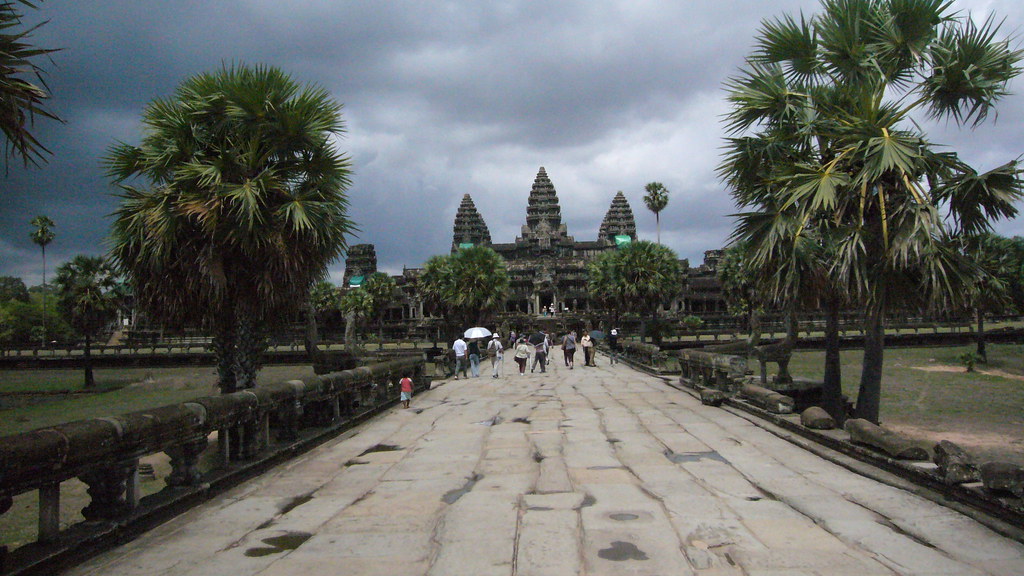
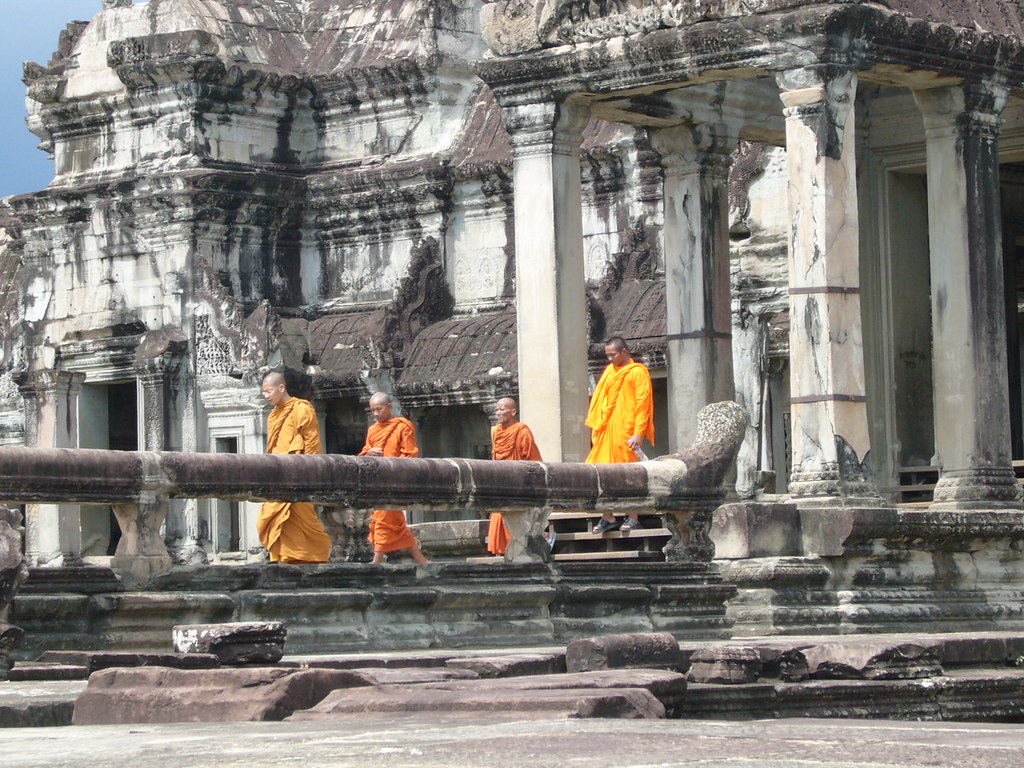

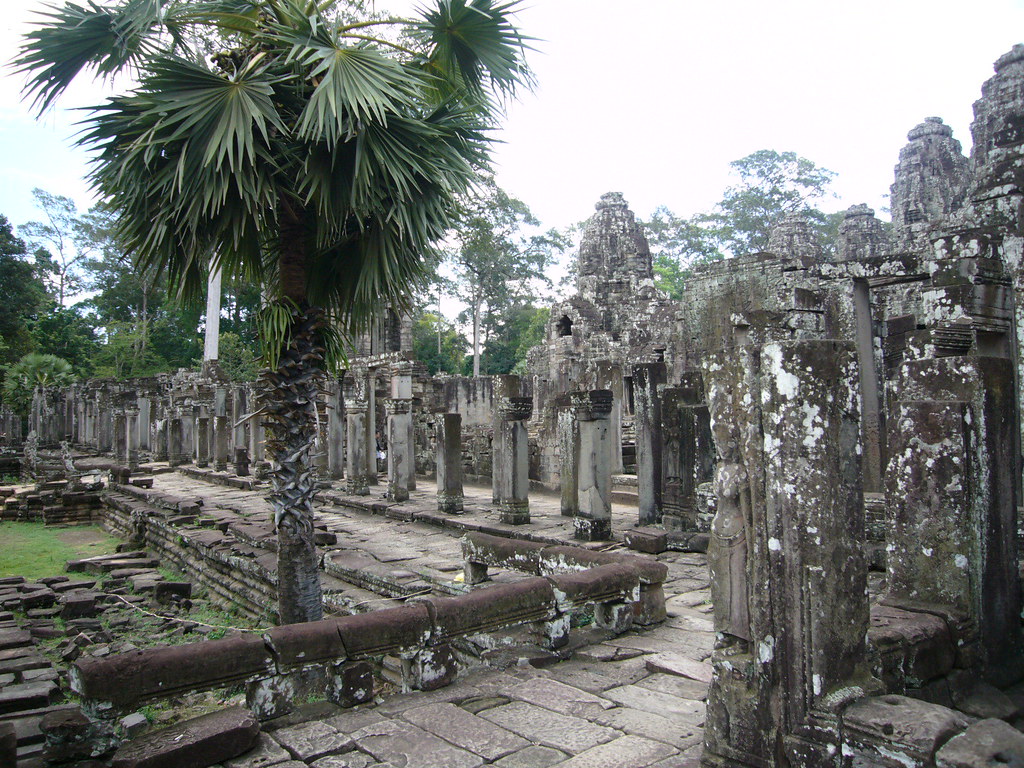
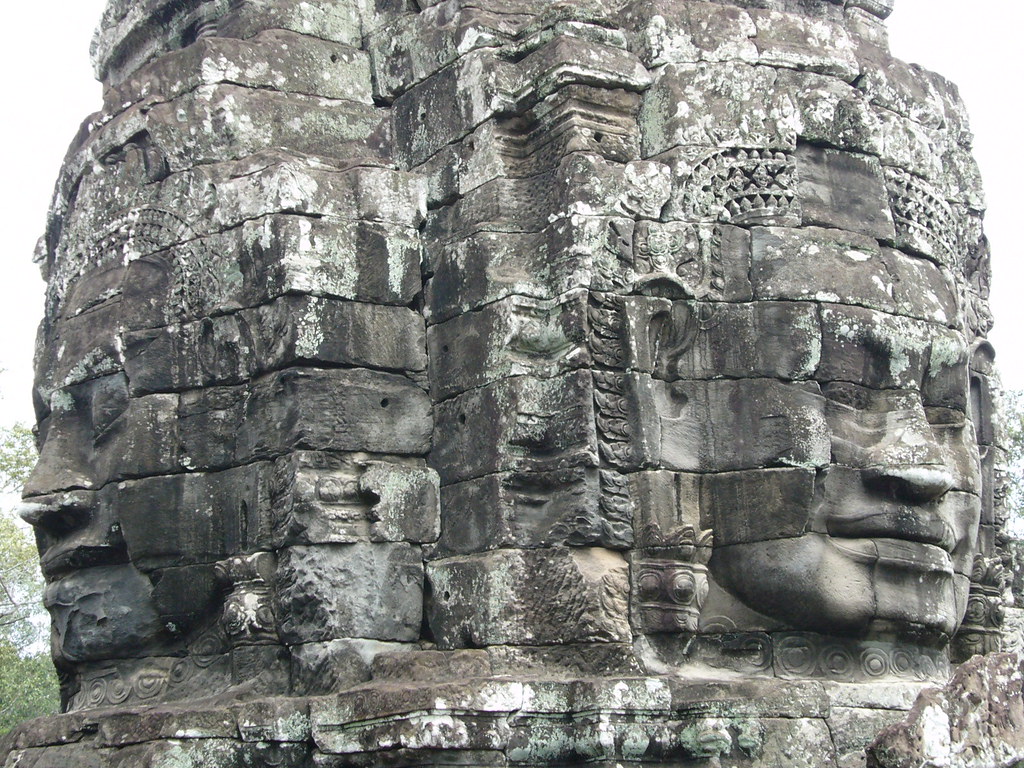
A few more photos can be seen here.
-----
We couldn't resist putting up some photos from Angkor Wat...





A few more photos can be seen here.
May 9, 2007
Day 91 - Sihanoukville
-----
As we end our days in Cambodia on a beautiful beach on the South Coast, we're reminded again of Cambodia's harsh past, peaceful present and hopeful future.
While we we're sending people to the moon and traveling the country in VW buses, Cambodia was experiencing genocide that only can be rivaled by the holocaust. When the Khmer Rouge took power of Cambodia from 1975-1979, close to two million Cambodians died, nearly a third of the population. Everything intellectual was destroyed including the intellects themselves, any printed material, cars, motorbikes, and even money. Before the Khmer regime, the exchange rate was $1USD to $69Riel. After, $1USD equaled $2000Riel. In wiping out 1/3 of the population and in destroying the econonmy, Cambodia lost at least half a century of development.
It seems they're still trying to catch up. While evidence of severe poverty still remain here, there are signs of rebuilding. The country has capitalized on tourism and it's bringing in floods of money. Many nations around the world, including Australia and Japan, are partnering with Cambodia for it's rebuilding. Huge street signs have paintings that on one side show Cambodia's poor past and on the other, her future of growth and prosperity. But what strikes me most about present Cambodia is that for the first time in a hundred years, an entire generation has grown up without war. And hopefully in peace, this country will become what it's working towards.
Phnon Penh: The Royal Palace
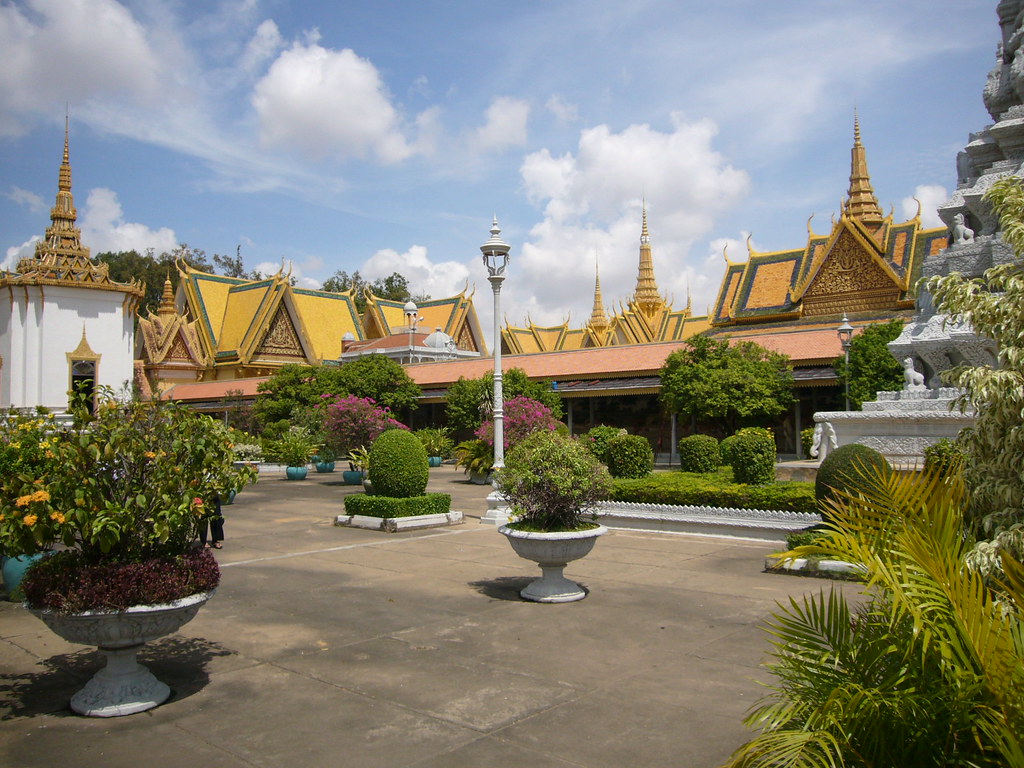
Phnon Penh: Side Street

Phnon Penh: Main Street
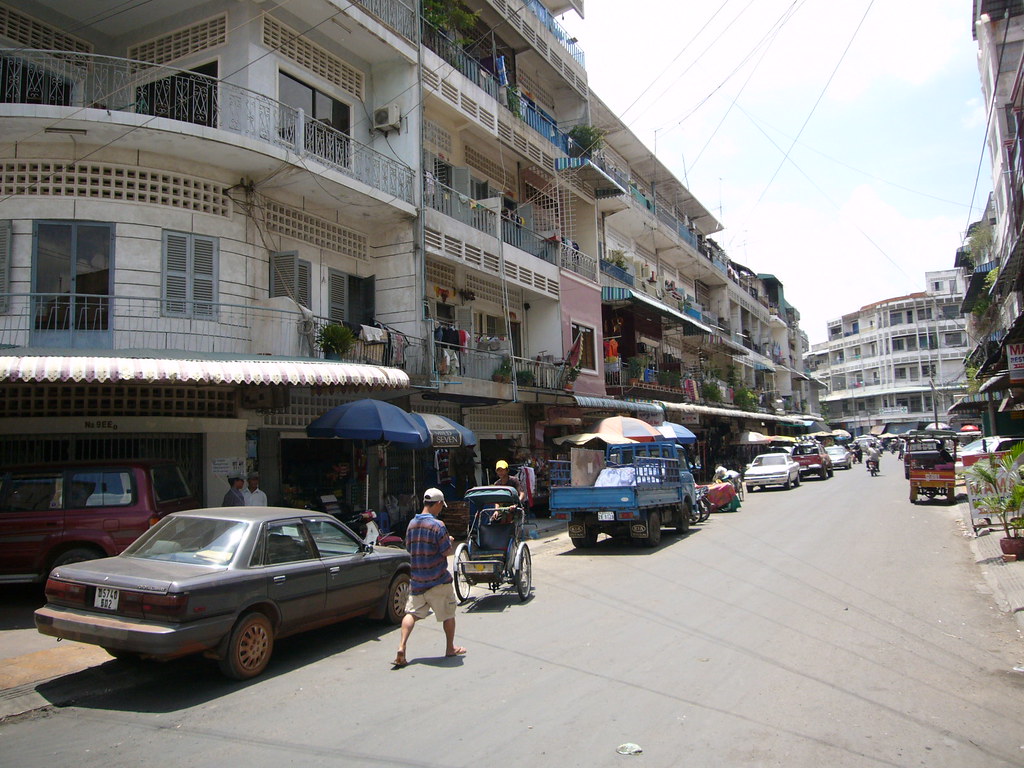
South Coast - Bokor National Park
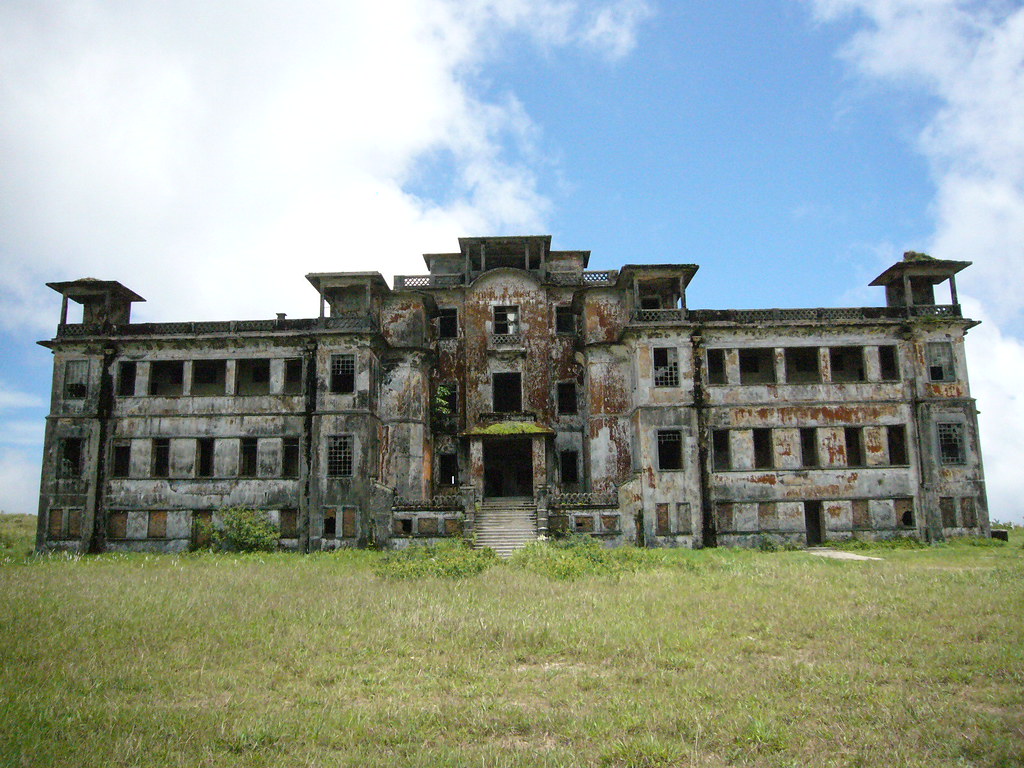
-----
As we end our days in Cambodia on a beautiful beach on the South Coast, we're reminded again of Cambodia's harsh past, peaceful present and hopeful future.
While we we're sending people to the moon and traveling the country in VW buses, Cambodia was experiencing genocide that only can be rivaled by the holocaust. When the Khmer Rouge took power of Cambodia from 1975-1979, close to two million Cambodians died, nearly a third of the population. Everything intellectual was destroyed including the intellects themselves, any printed material, cars, motorbikes, and even money. Before the Khmer regime, the exchange rate was $1USD to $69Riel. After, $1USD equaled $2000Riel. In wiping out 1/3 of the population and in destroying the econonmy, Cambodia lost at least half a century of development.
It seems they're still trying to catch up. While evidence of severe poverty still remain here, there are signs of rebuilding. The country has capitalized on tourism and it's bringing in floods of money. Many nations around the world, including Australia and Japan, are partnering with Cambodia for it's rebuilding. Huge street signs have paintings that on one side show Cambodia's poor past and on the other, her future of growth and prosperity. But what strikes me most about present Cambodia is that for the first time in a hundred years, an entire generation has grown up without war. And hopefully in peace, this country will become what it's working towards.




May 3, 2007
Day 94 - Bangkok
-----
[After spending 10 days in Cambodia, we ventured back into Thailand in order to fly out of Bangkok.]
It's official. After 94 days and 350+ hours of traveling by bus, train, taxi, mini-bus, boat and van, we are getting on an airplane. We were hoping to cross by land into Burma and then pass into India, but on account of closed borders, tribal fighting and a semi-corrupt Burmese government, there is no possible way to continue our journey on the ground.
Of course, forcing us into the air has created endless possibilites for our next destination. We considered heading down to Indonesia or skipping straight to Africa or even the Mediterranean. It was like we were playing with continents, getting to drift to wherever our hearts desired.
We fly out from Bangkok today.
_____________________________
Below you can see where we have traveled by land over the past three months.

-----
[After spending 10 days in Cambodia, we ventured back into Thailand in order to fly out of Bangkok.]
It's official. After 94 days and 350+ hours of traveling by bus, train, taxi, mini-bus, boat and van, we are getting on an airplane. We were hoping to cross by land into Burma and then pass into India, but on account of closed borders, tribal fighting and a semi-corrupt Burmese government, there is no possible way to continue our journey on the ground.
Of course, forcing us into the air has created endless possibilites for our next destination. We considered heading down to Indonesia or skipping straight to Africa or even the Mediterranean. It was like we were playing with continents, getting to drift to wherever our hearts desired.
We fly out from Bangkok today.
_____________________________
Below you can see where we have traveled by land over the past three months.

Subscribe to:
Posts (Atom)





